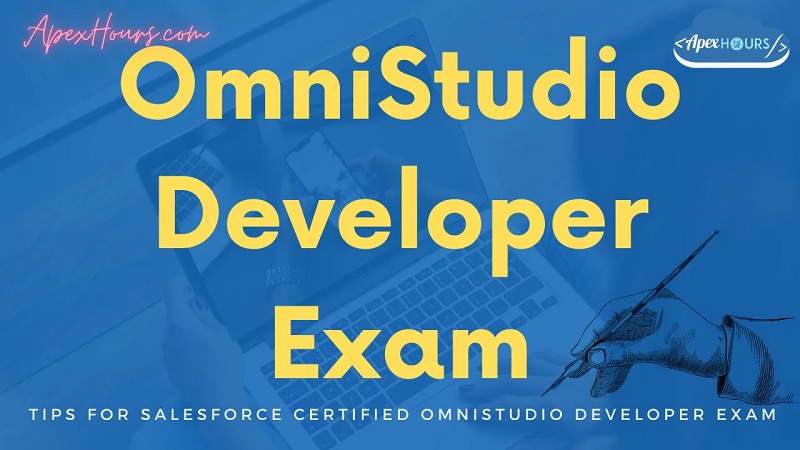What is the Structure of the OMNISTUDIO-DEVELOPER Exam?
The OMNISTUDIO-DEVELOPER exam is a multiple-choice test designed to assess a candidate’s knowledge and skills in developing and deploying applications with the OMNISTUDIO platform. The exam is composed of 65 multiple-choice questions that cover a range of topics related to developing, deploying, and managing applications with OMNISTUDIO. The exam is divided into four sections: Application Design and Development (20 questions), Application Deployment and Management (20 questions), Security (15 questions), and Troubleshooting (10 questions).
Each section is weighted differently, with Application Design and Development being worth the most points (30%), followed by Application Deployment and Management (30%), Security (20%), and Troubleshooting (20%). The exam must be completed within a two-hour time limit. Upon completion of the exam, candidates will receive a score report that indicates their passing or failing status.
What Are the Benefits of Passing the OMNISTUDIO-DEVELOPER Exam?
Passing the OMNISTUDIO-DEVELOPER Exam provides a number of benefits to those who successfully complete the exam. The most notable of these is gaining the OMNISTUDIO-DEVELOPER certification, which is a professional certification in the field of software development. This certification signifies that the individual has the skills and knowledge necessary to develop software solutions using OMNISTUDIO, one of the leading development platforms.
Holders of the OMNISTUDIO-DEVELOPER certification can demonstrate a higher level of expertise and experience to potential employers, making them a more attractive hire for software development roles. Additionally, employers may be more likely to offer higher salaries and other benefits to those with the certification. The exam also provides knowledge and skills which can be applied to developing software solutions more efficiently and effectively.
This can result in shorter development cycles and improved software reliability. Finally, successful completion of the exam can be a source of personal pride and satisfaction for those who have achieved it. This accomplishment can also open up new opportunities both professionally and personally.
How to Prepare for the OMNISTUDIO-DEVELOPER Exam?
Preparing for the OMNISTUDIO-DEVELOPER Exam can be a daunting task. However, with proper planning and preparation, you can increase your chances of success. Below are some tips to help you prepare for the exam.
1. Understand the Exam Content: The OMNISTUDIO-DEVELOPER Exam tests your knowledge of software development and design. Make sure you understand the topics that will be covered on the exam by studying the exam objectives.
2. Practice: Practicing with sample questions and practice tests can help you become familiar with the format of the exam and the types of questions you’ll be asked.
3. Review Relevant Resources: Reading books and articles related to software development and design can also help you understand the topics that will be covered on the exam.
4. Schedule Your Exam: Make sure to schedule your exam in advance and make sure you have enough time to study and prepare.
5. Get Adequate Rest: Make sure to get plenty of sleep before your exam to ensure you are well-rested and focused on the day of the exam. Following these tips can help improve your chances of success on the OMNISTUDIO-DEVELOPER Exam. Good luck!

What Skills Are Tested During the OMNISTUDIO-DEVELOPER Exam?
The OMNISTUDIO-DEVELOPER exam tests a candidate’s knowledge and skills in developing and deploying applications using the OMNISTUDIO development platform. Specifically, the exam covers topics such as the OMNISTUDIO development environment, designing and implementing application architecture, debugging and troubleshooting, and deploying and managing applications in the cloud. Additionally, the exam also assesses a candidate’s ability to use OMNISTUDIO specific APIs and tools, including the integration of various systems, services, and databases. Furthermore, the exam also tests an individual’s knowledge and skills in security, testing, and performance optimization.
What Are the Most Common Mistakes Made During the OMNISTUDIO-DEVELOPER Exam?
1. Not adequately preparing for the exam: Many candidates fail to adequately prepare for the exam by not taking the time to thoroughly review the material and practice with sample questions.
2. Not understanding the exam format: Some candidates may not be aware of the specific format of the exam, such as the type of questions asked, the number of sections, and the time limit.
3. Not reviewing the answer key carefully: Some candidates may not spend enough time reviewing the answer key for each question before submitting their answers.
4. Not managing time effectively: Many candidates find themselves running out of time during the exam due to not having a good strategy and failing to manage their time wisely.
5. Not knowing the exam content: It is important for candidates to know the type of questions asked, the topics covered, and the specific areas of focus within the exam.